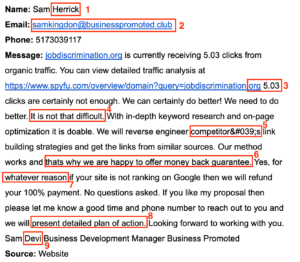SEO Scam Emails: Everything You Need to Know About Them

Are you a lawyer or business owner? Chances are, you’ve probably received many email solicitations. One of the many popular ones comes from SEO companies – often titled SEO Proposal or something to that effect. Sometimes these can be received through the contact form of a website, too.
As SEO and online marketers at NextClient, it’s pretty easy for us to catch these scams, but to the untrained eye, they can be more difficult to spot. As the years have gone by, SEO scams have gotten more creative, and some scams are better disguised than others.
Big companies like JC Penney have fallen prey to false promises and shady SEO tactics. Small businesses are especially vulnerable, as they may not know what to look for. We believe it’s important to be educated in these deceitful practices.
So without further ado, we’ll dive right into SEO email scams.
Why Do SEO Companies Scam or Spam?
SEO email spammers are generally just people trying to get more business. Their spamming tactics may be legal or illegal, but they aren’t always malicious. Sometimes, there are a few cases where the intention of these emails is to inflict harm. These types of emails could contain malware or a virus. This means if you open a link, you could get a virus.

Once the virus is on your computer, the hacker can find personal information. A general rule-of-thumb when approaching spam or unsolicited email is to mark the email as spam and move it to your trash. However, if you want to further vet the email for any “opportunities,” it’s best to be familiar with SEO email scam signs so you know what to look for.
Signs of an SEO Email Scam
Many of the signs that an SEO email is a scam are usually pretty obvious, like bad grammar or addressing you by the wrong name. And then, there are some that are the less obvious ones, such as guaranteeing a number one rank.
Below we made a checklist for some signs to watch out for in an SEO email scam.
We start with more obvious signs:
- Doesn’t address you by name
- Unprofessional email address (i.e. gmail.com or hotmail.com)
- No phone number
- Wrongly personalized (i.e. wrong name)
- Bad grammar
- No company, no name from the sender
- Info is unsolicited
- No website is given
- Bad subject line
Most of these signs can be caught if anyone were to pick through the email carefully. Oftentimes, these are the kinds of emails that have been blasted to many users not by SEO companies themselves, but by lead generation companies. The lead generation company will not know how to conduct the necessary analysis on your website to make any sort of assessment. And if they do, they use technical terms to throw you off. Additionally, you will not be able to vet the SEO company.
The next signs we address are the less obvious ones. Although you can recognize them, it does require you to learn a bit about SEO.
Less obvious signs for an SEO email scam:
- Unusually low prices for services
- Guarantees 1st position ranking
- References 1000s of search engines
Search engine optimization with meaningful results takes hard work. A company that offers cheap services for $50/month is not going to get the results you want for your company. Good quality SEO can run from a few hundred dollars a month up to thousands of dollars a month. Good SEO takes time, research, and expertise.
Companies that guarantee a 1st position ranking are also another red flag for an SEO email scam. Companies might get you to rank number one for some obscure search term that nobody searches for and doesn’t help you, but they’ve technically fulfilled your promise. In fact, one solicitation email to a jetski resort commented on how it was ranked 32nd for the keyword ‘florists.’ Clearly, they are not trying to sell their services to people buying flowers. SEO requires having expertise in the content and subject at hand.
On the other hand, if they are promising results for terms like ‘New York City personal injury lawyer’, they are extremely competitive. It takes time, careful strategic planning and a lot of content, such as blogs to rank well for terms like this. Companies will also try to lock you into long-term contracts. Our marketing firm only does month-to-month.
Lastly, a company that boasts it can get you on many search engines is just boasting. Google, Yahoo, Bing, and AOL have 95% of the search engine market.
Below we annotated an SEO scam email, so you can better understand the signs.
Annotated SEO Email Scam Example

Response to Scam Email (as numbered in the image):
- Last name is different from email (#2) and email signature (#9)
- Kingdon is different from Herrick (#1). Email domain businesspromoted.club is not an SEO company or professional website.
- The estimated traffic from SEO is random. When you follow the link, you’ll see the number is wrong. The number was randomly generated.
- This is false. SEO takes hard work and planning, especially when targeting meaningful keywords for your business. There needs to be a steady stream of content, which is disregarded in the email.
- Grammatical error. They meant to use an apostrophe, but “'” came across because they used an automatic email service. How does that reflect on the company’s tactics to “reverse engineer” the links?
- Grammatical error. “Thats” should be “That’s” and “offer a money back guarantee”
- Grammatical error. There should be a comma after “whatever reason”.
- Grammatical error. Missing “a” after present as there is a singular “plan of action”.
- Different last name from email header and name mentioned in the beginning.
With the grammatical errors, lack of professionalism, and lack of SEO knowledge you can see that the above is clearly SEO spam. Additionally, there is no company attached to the lead that would allow you to conduct research.
The Risk For Using These Services
Although it is possible to get a company solicitation email that is completely legitimate, 99% of companies turn out to be scams. For cheap prices with false guarantees, they likely engage in black hat SEO tactics, which can actually hurt your rankings. However, if you are considering services from an unsolicited email, it is important that you conduct research on the company and representative that reached out to you. Looking at their website, Google reviews, Yelp, and contacting their previous customers will help you make a more informed decision.
Conclusion & Summary
In summary, if you are unsure of what to do with an SEO solicitation email, it’s best to move it to the trash. Otherwise, conduct research on the company that emailed you. If that information is not available, it is quite telling of their motive in not being transparent.
